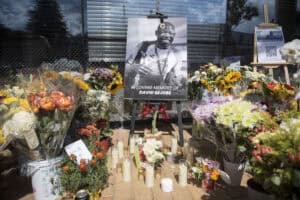Tribute: Johnny Depp aims to portray Tonto as more than just a sidekick in 'The Lone Ranger'.

Has the look of Tonto stayed broadly similar to that first image you created, inspired by the painting of the warrior?
Johnny Depp (JD): Yeah, it’s exactly that, although I didn’t have the wardrobe at the time, I was shirtless with stuff hanging off of me. On those first photographs the makeup is the same. The only thing that Joel changed was that he added texture to the white paint so that it was kind of like mud, like clay, that was put on his face.
And what about the bird on Tonto’s head? Where did that come from?
JD: In the painting the warrior had stripes down his face, slightly different from the ones we used for Tonto, but he had stripes down his face and what caught me in terms of that image was that it was like seeing four sections of the man dissected and in the painting. Just behind him, there was a crow flying, and at first glance I thought the crow was on his head.
It wasn’t, but I decided that the best thing to do was to take a dead bird and put it on top of my head as my spirit guide. Everyone should try it by the way-it really is something (laughs). But that was it the bird became his spirit guide.
Did you watch ‘The Lone Ranger’ as a kid?
JD: Yeah, I did. I remember seeing The Lone Ranger, it was one of those regular things that you would see on television as a kid. I watched it and I always identified with Tonto. And even as a kid I wondered why the Indian was the sidekick. And it wasn’t that the Lone Ranger was overtly disrespectful in the way he treated Tonto but I just thought, ‘Why is he the guy that has to go and do this and that? Why isn’t he the hero?’
So that was something that was always on my mind. And I was told at a very young age that we have some Indian blood in our family. Who knows how much? Maybe very little, I don’t know. Although my great grandmother on my mother’s side had quite the look with the braids and everything. She was a wonderful, beautiful woman and she lived until she was 102 and chewed tobacco until the day she died. She was an amazing woman.
Was she the one who told you about your heritage?
JD: Yeah. We had heard about it as kids so then I guess from that I wanted to learn more about Native Americans and also wanted to find out as much as I could about our heritage and our ancestry. And you watch cowboy movies and the Indians were always portrayed as these savages, as the bad guys, which didn’t sit right with me.
So when I played Cowboys and Indians as a five, six-year-old boy, I wanted to be the Indian. And now, all these years later, I’m playing Tonto, which is great. And the only way I could do it, for myself and for the Native Americans, was to play Tonto with great dignity and integrity and at the same time a sense of humor about the white man and all the things that they do. This is my little salute to them.
Your creation of Tonto is very different from the incarnations we’ve seen before on the TV show. Can you tell us how you made your Tonto relevant to today?
JD: I think he is relevant because, for me, however long cinema has been around the Native American has been treated very poorly by Hollywood for the most part. And what I wanted to do was play this character not as the sidekick to the Lone Ranger. I wanted to play him as a warrior and as a man with great integrity and dignity. It’s my small sliver of a contribution to try and right the wrongs that have been committed in the past.
Support Local Journalism
Add The Citizen as a Preferred Source on Google and follow us on Google News to see more of our trusted reporting in Google News and Top Stories.









